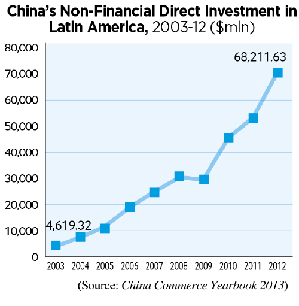|
 |
|
EXPORTING SPEED: An electric bullet train made by Chinese railway manufacturers goes into operation in Argentina's capital Buenos Aires on July 21, 2014 (JIANG CHAO) |
In an interview with China's Xinhua News Agency, Severino Cabral, Director of Brazil's Institute of China and Asia-Pacific Studies, said that China's proposals for building a broader and more flexible cooperation platform would mobilize all Latin American and Caribbean countries to integrate themselves into global common development via their cooperation with China, and would mark a new epoch for the development of China-CELAC relations as well as the world economy.
Marco Navas, an Ecuadoran expert on international issues, said that the Chinese proposal is "exciting" and sends a positive signal for advancing the China-CELAC comprehensive cooperative partnership, noting that the door to "China opportunities" is being opened to the Latin American and Caribbean region.
Outside reactions
Most Western media outlets interpreted the First Ministerial Meeting of the China-CELAC Forum as a sign of growing Chinese influence in Latin America, while some read too deeply into China's move as a way to wean off the United States. However, officials and observers from China and Latin American countries do not see it that way.
Wu with the CICIR claimed that with its geographical vicinity and traditional links, the United States enjoys a much larger influence on Latin American countries in terms of both economy and security.
Wu Baiyi, Director of the Institute of Latin American Studies under the Chinese Academy of Social Sciences, said that China's cooperation with CELAC does not necessarily constitute competition with the United States as the two are at different development stages. China's cooperation with Latin America can be seen as a kind of complement to that of the United States, according to Wu Baiyi.
García also emphasized in his article that the China-CELAC cooperation does not hurt any third party. Latin America is not merely the "backyard" of any country—rather, it seeks international cooperation based on its own needs for development and the balance of international relations.
When addressing the closing ceremony of the Beijing ministerial meeting, Chinese Foreign Minister Wang Yi said that the China-CELAC cooperation is "open, inclusive and balanced" and excludes no third party.
"In cooperation with developing countries, China will consider their need for self-development instead of simply trade and investment or mere one-off sales of resources and energy," Wang said.
Email us at: yulintao@bjreview.com

| 